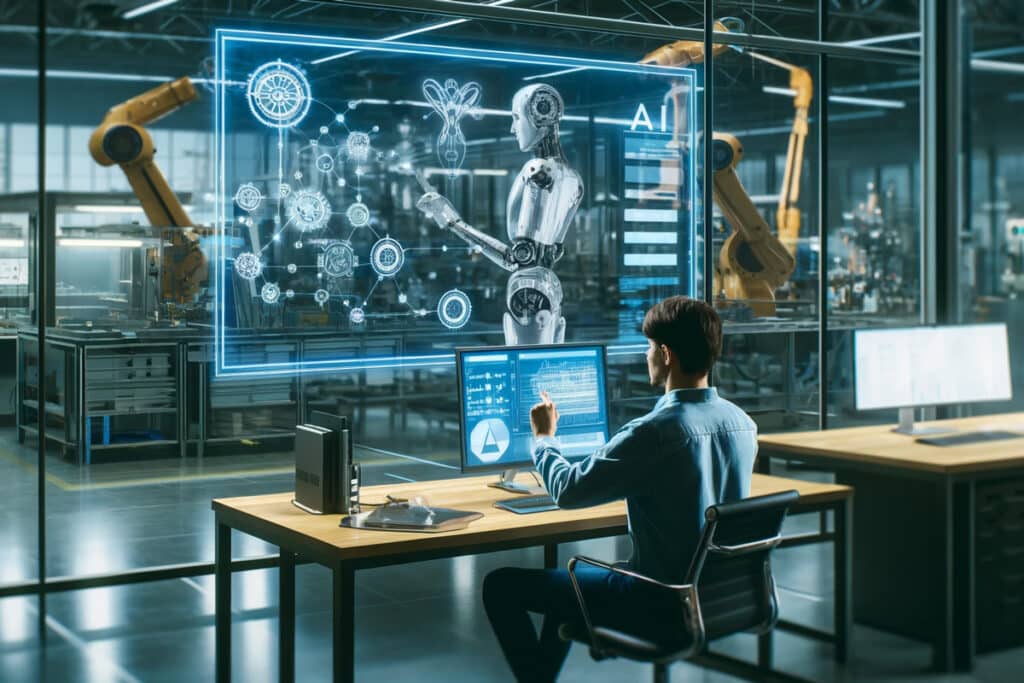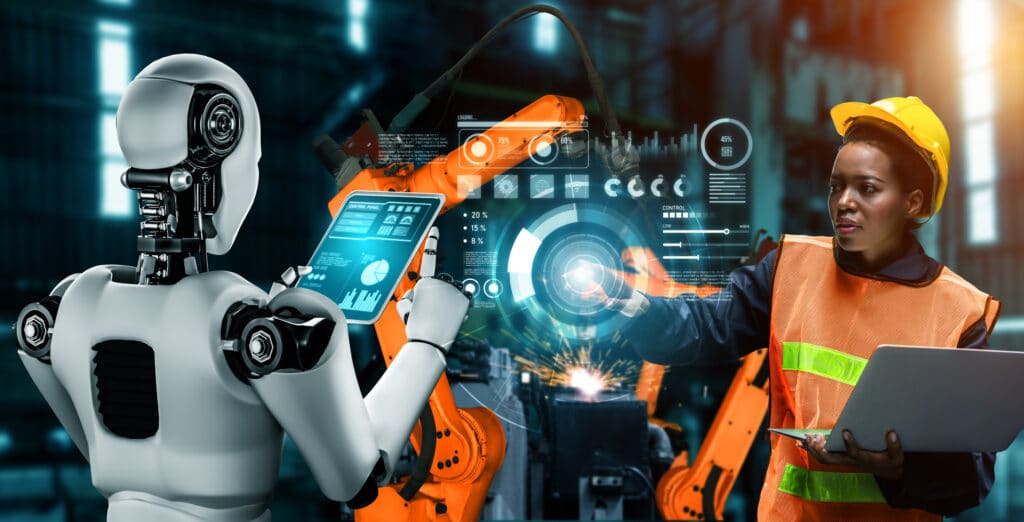AI technology in use for process optimisation in production & logistics
Artificial intelligence is now an established technology for optimally designing or controlling processes in production, logistics, supply chains or other areas. There are now various AI processes that are used or offered in ready-made solutions (e.g. via Pathmind, Bonsai, H2O.ai):
- Reinforcement Learning
- Classifier
Challenge: Selection and training of a solution
The particular challenge in the application of AI methods is usually the selection and training of a solution (e.g. in-house development). As a rule, this cannot and should not be done on real systems, since extreme events can occur, especially in the first learning phase. In order to exclude this risk, simulation methods are used which, in combination with the AI application, represent an optimal solution:
- A simulation model provides realistic (dynamic) data of a possible scenario (typical challenge when using AI procedures).
- The model serves as a training partner to show decisions and their effects to the AI in a very short time.
- Extensive and risk-free pre-testing of AI solutions before they are released.
- Comparison of AI solutions or solution procedures.
- Quantitative evaluation of AI procedures to other possibly more cost-effective alternatives (classical optimisation procedures).
SimPlan provides the necessary technologies for such an environment, up to the point that we develop appropriate models and building blocks for our customers so that they can find, evaluate and risk-free introduce their AI application without in-depth simulation knowledge.
Generating valid data for simulation models
Extensive data is often available in the company, which is used as the basis for simulation models. It can happen that the data is not complete and error-free. In addition, this data must be adapted/manipulated for a possible future scenario. An AI helps to carry out such data preparation quickly and efficiently and thus significantly reduce the data provision effort.

Future prospects: How artificial intelligence will make simulation easier
At SimPlan, we recognise that Artificial Intelligence (AI) will change the way simulations and digital twins are used. In the future, we plan to use intelligent AI algorithms to optimise the creation of simulation models. This will allow us to streamline design creation and iterations and significantly speed up the process of finding solutions. We expect that this AI-driven optimisation will not only speed up the simulation process, but also significantly improve its accuracy and effectiveness.
Efficiency and accuracy through AI
There is enormous potential to increase the efficiency and accuracy of our simulations through the use of AI technologies. In the future, we want to use techniques such as deep learning to speed up the creation of simulation models and solve complex problems in less time. In addition, we could use generative AI to fill in missing data points in the layout, process or input data to achieve more comprehensive and accurate results. These developments would help us to find better solutions in e.g. factory planning and optimise the entire workflow.
Advantages of AI-supported simulation
The future use of AI in our simulations could offer numerous advantages:
- Accelerated creation and therefore lower costs: we expect that the automation and optimisation of simulation processes will enable us to develop and implement new designs and solutions more quickly.
- Democratisation of simulation: AI could make advanced simulation tools more accessible and user-friendly, which would significantly lower the barriers to the use of such technologies.
- Comprehensive data processing: In the future, AI could efficiently process, analyse, correct and augment large amounts of data, leading to more informed and accurate simulation results.
- Continuous learning: Future AI models could continuously learn and automatically adapt to new processes and data, which would make it easier to maintain models and facilitate their continuous use.
AI brings simulation and reality together more easily
In the future, simulation-based AI, supported by the highly parallel processing of modern graphics cards, will enable us to simulate highly complex logistical processes in real time. This technology could drive the creation of a digital reality in which AI can operate. We assume that by merging simulation and reality, it will be possible to effectively implement and maintain the digital twin of entire logistics or production systems, in which development and maintenance cycles are carried out by an AI. We see great potential in the logistics sector in particular, where automation and robots could potentially operate seamlessly between simulation and reality in the future.
AI in the logistics sector: a vision of the future
In Germany, the use of AI in the logistics sector will play an increasingly important role. In view of the optimisation problems in logistics and the high economic and social importance of the industry, we expect AI and machine learning (ML) to become key drivers of the future. In the future, AI could enable us to utilise resources more efficiently, improve logistics services and create new business models.
Outlook for integration and collaboration
Our aim is not to view AI in isolation, but to integrate its functionalities into neighbouring systems. We plan to simulate AI algorithms together with other components to better understand their effects and functions before using them in practice. This integration could optimise the workflow for engineers and shorten development times, as models could be developed, tested and validated accurately and cost-effectively.
Generative design and simulation
Another future project at SimPlan is the use of generative design, where AI and simulation could work hand in hand. We envisage designs being generated using AI and then checked using simulations in order to develop innovative and optimised design solutions that meet the requirements of complex technical tasks.
The future of logistics automation
We see simulation-based AI as the basis for future automation in logistics. New developments in the field of sensor technology and robotics could enable us to make robots and automated systems even more efficient and intelligent. This vision is crucial for optimising logistics processes and creating a seamless digital continuum.
Conclusion: A look into the future
The integration of AI into our future simulation technology offers immense opportunities to fundamentally change the way we work at SimPlan. By optimising processes, improving accuracy and accelerating innovation, we expect AI to make a significant contribution to increasing efficiency and reducing costs. In an increasingly data-driven world, AI’s ability to continuously learn and adapt will be a key advantage that will significantly shape the future of simulation and logistics.
As part of research and development projects, we at SimPlan are working on the development of the aforementioned possible applications of AI with and for simulation.
Take a look here and find out about our current research projects.

